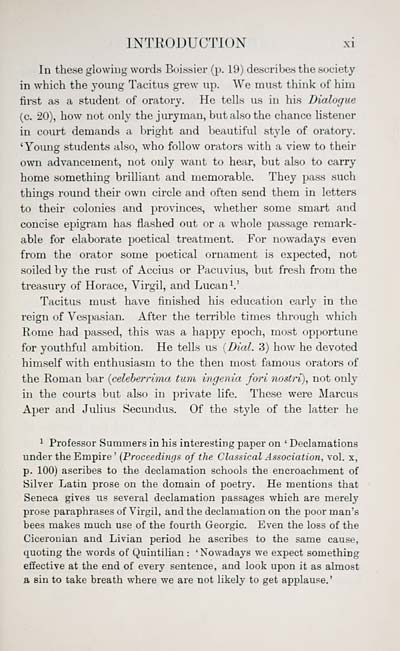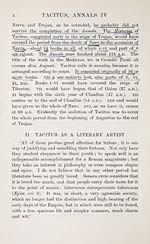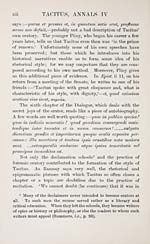Download files
Complete book:
Individual page:
Thumbnail gallery: Grid view | List view

INTRODUCTION xi
In these glowing words Bois.sier (p. 19) describes the society
in which the young Tacitus grew up. We must think of him
first as a student of oratory. He tells us in his Dialogue
(c. 20), how not only the juryman, but also the chance listener
in court demands a bright and V)eautiful style of oratory.
'Young students also, who follow orators with a view to their
own advancement, not only want to hear, but also to carry
home something brilliant and memorable. They pass such
things round their own circle and often send them in letters
to their colonies and provinces, whether some smart and
concise epigram has flashed out or a whole passage remark-
able for elaborate poetical treatment. For nowadays even
from the orator some poetical ornament is expected, not
soiled by the rust of Accius or Pacuvius, but fresh from the
treasury of Horace, Virgil, and Lucan *.'
Tacitus must have finished his education early in the
reign of Vespasian. After the terrible times through which
Rome had passed, this was a ha^jpy epoch, most op^jortune
for youthful ambition. He tells us {Dial. 3) how he devoted
himself with enthusiasm to the then most famous orators of
the Roman bar {celeherrima turn ingenia fori nostri), not only
in the courts but also in private life. These were Marcus
Aper and Julius Secundus. Of the style of the latter he
1 Professor Summers in his interesting paper on ' Declamations
under the Empire ' (Proceedings of the Classical Association, vol. x,
p. 100) ascribes to the declamation schools the encroachment of
Silver Latin prose on the domain of poetry. He mentions that
Seneca gives us several declamation passages which are merely
prose paraphrases of Virgil, and the declamation on the poor man's
bees makes much use of the fourth Georgic. Even the loss of the
Ciceronian and Livian period he ascribes to the same cause,
quoting the words of Quintilian : 'Nowadays we expect something
effective at the end of every sentence, and look upon it as almost
a sin to take breath where we are not likely to get applause.'
In these glowing words Bois.sier (p. 19) describes the society
in which the young Tacitus grew up. We must think of him
first as a student of oratory. He tells us in his Dialogue
(c. 20), how not only the juryman, but also the chance listener
in court demands a bright and V)eautiful style of oratory.
'Young students also, who follow orators with a view to their
own advancement, not only want to hear, but also to carry
home something brilliant and memorable. They pass such
things round their own circle and often send them in letters
to their colonies and provinces, whether some smart and
concise epigram has flashed out or a whole passage remark-
able for elaborate poetical treatment. For nowadays even
from the orator some poetical ornament is expected, not
soiled by the rust of Accius or Pacuvius, but fresh from the
treasury of Horace, Virgil, and Lucan *.'
Tacitus must have finished his education early in the
reign of Vespasian. After the terrible times through which
Rome had passed, this was a ha^jpy epoch, most op^jortune
for youthful ambition. He tells us {Dial. 3) how he devoted
himself with enthusiasm to the then most famous orators of
the Roman bar {celeherrima turn ingenia fori nostri), not only
in the courts but also in private life. These were Marcus
Aper and Julius Secundus. Of the style of the latter he
1 Professor Summers in his interesting paper on ' Declamations
under the Empire ' (Proceedings of the Classical Association, vol. x,
p. 100) ascribes to the declamation schools the encroachment of
Silver Latin prose on the domain of poetry. He mentions that
Seneca gives us several declamation passages which are merely
prose paraphrases of Virgil, and the declamation on the poor man's
bees makes much use of the fourth Georgic. Even the loss of the
Ciceronian and Livian period he ascribes to the same cause,
quoting the words of Quintilian : 'Nowadays we expect something
effective at the end of every sentence, and look upon it as almost
a sin to take breath where we are not likely to get applause.'
Set display mode to: Large image | Transcription
Images and transcriptions on this page, including medium image downloads, may be used under the Creative Commons Attribution 4.0 International Licence unless otherwise stated. ![]()
| Early Gaelic Book Collections > Matheson Collection > Annals of Tacitus, Book IV > (15) |
|---|
| Permanent URL | https://digital.nls.uk/76544068 |
|---|
| Description | Items from a collection of 170 volumes relating to Gaelic matters. Mainly philological works in the Celtic and some non-Celtic languages. Some books extensively annotated by Angus Matheson, the first Professor of Celtic at Glasgow University. |
|---|
| Description | Selected items from five 'Special and Named Printed Collections'. Includes books in Gaelic and other Celtic languages, works about the Gaels, their languages, literature, culture and history. |
|---|

